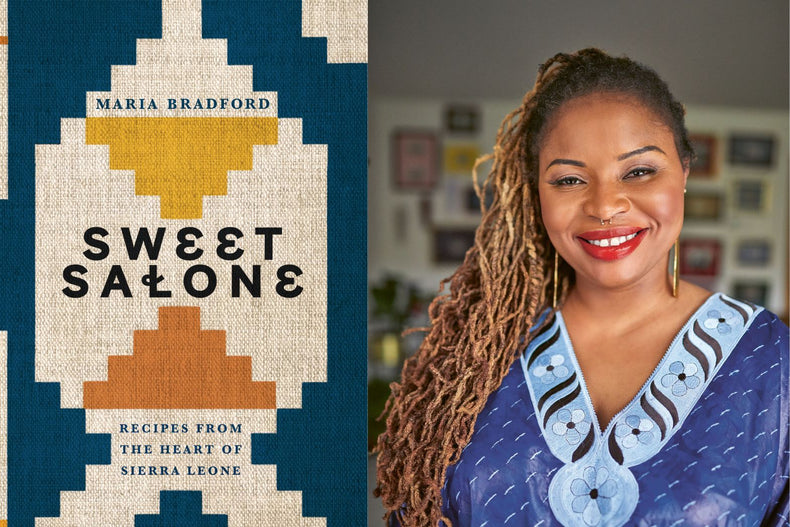Maria Bradford On The Flavours Of Sierra Leone

Maria Bradford was born in Sierra Leone. She grew up in Freetown, and started helping her mother prepare family meals from about nine years of age. Inspired by her heritage, Maria reinvents traditional African dishes to create high end Afro-fusion cuisine.
Her recipes (find three linked below!), have at their heart the traditional meals of Maria’s childhood. Characterised by key ingredients including tamarind, beans, sesame seeds, mango, chilli and pineapple, in Maria's hands these ingredients become something truly special.
Moreover, she tells the story of the cuisine and the people, shedding light on everyday life through exclusive location photography. We ask her what makes the food of Sierra Leone so exciting.
Sweet Salone by Maria Bradford (Quadrille, £30) recipe photography by Yuki Sugiura
Browse Maria's pick of the Sous Chef ingredients she loves to use, here.
What’s the best thing you’ve eaten recently?
I had the full menu at Akoko Restaurant in London, recently. This restaurant and the menu itself celebrates the rich culture of West Africa.
How do you balance tradition and innovation in your cooking?
I won’t ever compromise the authenticity of a traditional Sierra Leonean main. Traditional dishes hold deep cultural significance and are an important part of our heritage. You simply shouldn’t mess with it. They are passed down through generations and carry stories, rituals, and traditions.
I think altering or compromising a traditional dish will diminish its cultural value and disconnect it from its roots. I just won’t do it. I will choose the finest ingredients I can find, or adopt cooking techniques that enhance the flavours, without compromising any of the dishes authenticity.
When I cook Afro-fusion all bets are off. Afro-fusion cooking refuses to adhere to political or geographically drawn borders, nothing is forbidden and this allows me to innovate.
By its very nature it allows for creative interpretations and combinations, breaking away from the boundaries of traditional cuisines. It is the space I like to play.
TRY: Maria's recipe for Shapka, Egusi Soup
What dish do you make most often?
I cook Cassava leaf sauce (plasas).
What is one recipe everyone should try from the book?
Braised beef short ribs in peanut and coconut milk on page 110.
What will surprise people in your book?
There is so much to surprise people in this book. There’s history, culture, women empowerment, migration, charity, a vision for the future of Sierra Leone, there’s jokes, there’s a story about family.
Where do you find inspiration?
I find inspiration from my personal experiences, but also from ingredients, travel, traditions and food cultures.
RECIPE: Cassava Chips With White Truffle Oil, Parmesan and Saffron Mayo
What is your favourite ingredient to work with and why?
Hibiscus petals
How do you source your ingredients and what do you look for when selecting them?
I source from reputable suppliers who source directly from farmers, producers and artisans. I have built relationships over the years with them.
I ask a lot of questions and they now know me and offer suggestions themselves when something is seasonal or has been a particularly good year.
My suppliers know I want the best and sometimes if I ask them for something they won’t supply if it is not at it’s best. It’s a great place to be with them. I trust them and they trust me.
How do you stay current with food trends and incorporate them into your menu?
I travel and explore different culinary scenes for example this year I took a food course in Cyprus, last year I did one in Cambodia and the year before I visited the Prosecco hills in Italy and stayed on a farm. This has got to be the best bit of my job.
MORE: Try Maria's Sierra Leonean-style Beef Stew, the perfect pairing with Jollof rice
Can you tell me about a particularly memorable meal you have had and what made it so special?
Whilst undertaking the location photography shoot, I travelled to Sierra Leone with a team and we visited my great grandmothers village Bandajuma, in Bo District which is in the Southern Province.
When we arrived they had (as a community) cooked a sweet potato leaf plasas. Oh my gosh it was legendary! It was special because of skilful and creative preparation, quality of the ingredients for example the sweet potato leaves were grown organically in someone’s backyard, the rice was traditional Salone red rice grown locally.
The fish was caught in the river behind my great grandmother’s house. The meat was reared locally and the sustainable red palm oil produced at the farm in the village. So I guess it was this and the shared experience and emotional connections.
Feeling Inspired? Explore more African food and ingredients at Sous Chef





